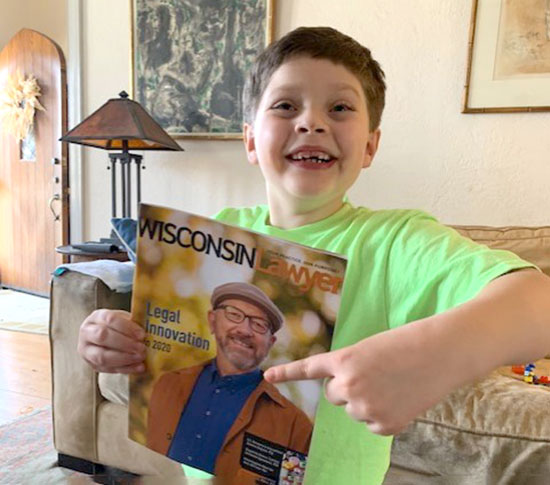Practicing in Greater Wisconsin is Great, If You Have Reliable Broadband Internet

I appreciated President Brost’s recent message about practicing in Greater Wisconsin (“Is Greater Wisconsin for You?” Wisconsin Lawyer, November 2020). My run of more than 30 years practicing from downtown offices in Milwaukee, Chicago, and Phoenix came to an end on March 12, and I’ve spent the past nine months of the COVID pandemic working from my home office. The transition home was almost entirely seamless – consistent with President Brost’s statement that “it no longer matters where you are so long as you have a working internet connection.”
Nowadays, I conduct my practice through a dedicated high-speed line downloading at 300 mbps, in a home wired with three high-speed wireless networks. Including my wife (a law firm manager, also working from home) and my two college-age kids, we run about 650-800GB of data each month without a hitch.
Inspired by the success of the venue change – and worn down, I’ll admit, by three summers in the furnace that passes for summertime in central Arizona – I also recently bought a home “up north” with the plan of decamping there for the summer months. What I didn’t appreciate entirely is just how impossible it is, practically speaking, to find a decent high-speed connection in the Northwoods. At my new home in southern Iron County, Wis., for example, the very best I can hope for is satellite wireless downloading at 20 mbps (uploading at 3 mbps). In fact, I’ll be lucky to get 12-15 mbps. And this assumes, I might add, that we can engineer the necessary sightlines; if not, we’ll need a tower as well.
It also bears noting that the available service runs $155 per month for usage capped at 50GB. Even with the college kids spending summers elsewhere, we will need to carry two wireless services, for a total of $310 per month. This compares to the $120 I pay for a plan that maxes at 1280GB per month to my home in Arizona. While $310 per month and the necessary hardware aren’t a financial hardship for a law firm partner, it’s an outlandish sum of money for a working family to pay for what amounts to a public good.
Thus, while “a working internet connection” makes law practice highly mobile in concept, the practical fact is that the inaccessibility of decent, affordable high-speed service is most certainly an impediment to relocating a law practice to Greater Wisconsin. More importantly, it is a considerable disadvantage to students and to businesses in rural areas, where unequal access to competent internet service is adding another stressor to the pandemic. In this respect, Wisconsin trails neighboring Minnesota, its economic competitor, by a considerable stretch. While 16 percent of rural households in Minnesota lack access to high-speed internet, that fraction in Wisconsin is 31 percent.
The State Bar of Wisconsin could, it seems to me, have a role in addressing the state’s failure to invest in the wireless infrastructure that is increasingly crucial to economic growth. Bar leadership should, it seems to me, do so from both a policymaking and an advocacy standpoint – perhaps even from a functional standpoint (helping establish, for example, wireless service cooperatives as part of a solution). Doing so would draw more lawyers and other professionals and knowledge workers out of southern Wisconsin and make the services those folks provide more accessible in Greater Wisconsin.
Michael Ostermeyer
Scottsdale, Ariz.
Response: Thank you for your response to my article in Wisconsin Lawyer. High-speed internet continues to be an issue that hinders the ability of lawyers to work in many areas of Wisconsin. Some areas have acceptable service but many areas do not. The circuit courts seem to have acceptable service throughout the state, but many attorneys, their clients, and their families are unable to access high-speed service in their offices and in their homes.
The State Bar of Wisconsin supports establishing high-speed internet statewide. The State Bar’s Strategic Planning Committee and Greater Wisconsin Initiative task force are both reviewing what the State Bar can do to increase high-speed internet development for lawyers working in rural areas of Wisconsin. Thankfully, it is an issue that is getting bipartisan support throughout the United States and in Wisconsin. Governor Evers has established a task force on developing high-speed internet throughout rural Wisconsin. In addition, I have specifically asked Wisconsin’s Congressional delegation to support legislation for developing high-speed internet in rural areas of the United States.
Thank you for sharing your situation. It is incredibly helpful to have specifics to support and increase our advocacy on this topic.
Kathy Brost
President, State Bar of Wisconsin
kbrost@lptrust.com; kbrost@brostlawoffices.com
We Want to Hear from You! Submit a Letter to the Editor
Wisconsin Lawyer provides a forum for members to express ideas, concerns, and opinions on law-related subjects. Send comments to wislawyer@wisbar.org (include “Letters” in the subject line), or mail to Wisconsin Lawyer “Letters,” P.O. Box 7158, Madison, WI 53707-7158. Limit to 500 words. Writing guidelines available.
Connect With Us Online. Post comments to articles
online, and find us on Facebook, Twitter, LinkedIn, YouTube, and Instagram.
Finding a Solution for Overwhelming Student Debt

In “Time to Address Student Debt” (Wisconsin Lawyer, November 2020), State Bar executive director Larry Martin wrote, “For thousands of lawyers across our state and nation, the thought of being able to move beyond a life of heavy school debt is but a dream.” He described how the State Bar is working to support legislative efforts that reduce the cost of legal education and to provide loan repayment assistance programs when appropriate, and invited members’ direct involvement in those efforts.
A reader responded.
Reader: Thank you for your recent focus on student debt in the November Wisconsin Lawyer and via social media. We were fortunate to have several Wisconsin lawyers serve on the Governor’s Council on Student Debt. Their combined experiences and intellect provided great ideas and recommendations that are now under consideration by Governor Evers.
We appreciate all the work that you and the State Bar of Wisconsin do and look forward to working together in the future.
Kathy Blumenfeld
Cabinet Secretary, Wisconsin Department of Financial Institutions
How Do GALs Actually Get Appointed?

In “GAL Appointments: Am I Eligible?” (Wisconsin Lawyer, September 2020), Gretchen Viney answered the frequently asked question: Am I eligible to accept a court appointment as guardian ad litem? The article incorporates changes to Supreme Court Rule 35, effective for family court orders entered after Jan. 1, 2021.
A reader posed a question.
Reader: I have been certified and have attended many GAL continuing education offerings in the past, and I plan on doing so for 2021. The problem is that I don’t know how to actually get appointed. It seems that the counties I work in are doing anything but randomly appoint GALs, and the same GALs get appointments consistently. How does someone get on the list somewhere to actually get appointed? (I work in Outagamie, Winnebago, and Calumet and surrounding counties.)
Steven D. Johnson
Johnson Law Firm SC, Appleton
Author response: The process for garnering GAL appointments varies widely from county to county and depends on the type of appointment (children, Wis. Stat. ch. 48; adult guardianship and protective placement, Wis. Stat. chs. 54 and 55; family, Wis. Stat. ch. 767).
In some counties, the appointment lists are kept by the individual judges and court commissioners. In other counties, appointments are based on centralized lists for each type of appointment, typically maintained by the offices of the clerk of courts, register in probate, and children’s court clerk (which may be the same as the register in probate). In a few counties, some or all of the appointments are based not on lists but on contracts. In those counties, lawyers and the county have entered into an agreement that governs appointments and payment rates. Although the specifics of these contracts differ, the common element is that the courts appoint only the lawyers “on the contract.”
Just to complicate the situation, some counties may have contracts for only certain areas of GAL work. For example, a county might have a wide-open list for ch. 767 appointments but have a contract-only list for ch. 48. Or, a county might have one contract that covers all areas of GAL work.
The easiest way to find out your county system is to talk to a GAL, if you can identify one. More formally, you can check with the offices of the clerk of courts, register in probate, children’s court clerk (which may be the same as the register in probate), and family court commissioner. Once you know the system, you will know who to contact to be added to the appointment lists.
Gretchen Viney
Make a Difference: Give to Our Communities and Profession

In “Helping Others: Support for Worthy Organizations” (Wisconsin Lawyer, October 2020), State Bar executive director Larry Martin wrote, “For those of us who are in a position to do so, I urge you to join me in supporting the work of these critically needed organizations.”
Martin wrote that worthy charitable organizations are being hit hard, at the very time when their work is needed in our communities more than ever. This includes the Wisconsin Equal Justice Fund (WEJF), the Wisconsin Trust Account Foundation (WisTAF), and the Wisconsin Law Foundation (WLF), the charitable arm of the State Bar of Wisconsin.
A reader responded.
Reader: I just wanted to thank you for the shout-out to the WEJF (as well as WisTAF and the Wisconsin Law Foundation). Your efforts as well as those of the State Bar of Wisconsin on behalf of pro bono civil legal aid are extremely meaningful, especially during the current economic environment. I wanted to personally thank you for your leadership and support of the WEJF.
As you know, the WEJF is very fortunate to have Tom Hornig at the helm this year. With Melissa Sullivan’s continuing guidance and direction, the WEJF will keep moving forward in its efforts on behalf of its three beneficiary organizations.
Michael Levey
National Pro Bono Partner, Quarles & Brady LLP, Milwaukee
Calling All Innovators: Tout Your Solutions

In “Legal Innovation in 2020” (Wisconsin Lawyer, November 2020), Ed Finkel wrote that this year’s Wisconsin Legal Innovators, amid difficulties created by COVID-19, came up with creative solutions to address a range of issues: access to healthcare, technology advances in state court operations, compassionate release of dying prisoners, accuracy in forensic science, and socially distanced assistance for domestic violence victims.
Last year’s Lifetime Legal Innovator honors Bobby Peterson for his career-long passion to keep learning and thinking creatively to ensure all people have access to healthcare. He is the executive director of Madison-based ABC for Health Inc.
Know a legal innovator? Are you one? Nominations for 2021 open March 1 and close on June 30. Learn more at ThatsaFineIdea.com.
A reader responded with a photo.
Reader: The magazine arrived in our mailboxes today, and it looks great. Congrats to this year’s winners and your team! We’ve already gotten some nice emails, phone calls, and text messages. My sister sent the accompanying photo of my nephew when the magazine arrived at her house. He loved it!
Brynne McBride
ABC for Health Inc., Madison
Cite to 94. Wis. Law. 6-8 (January 2021).
